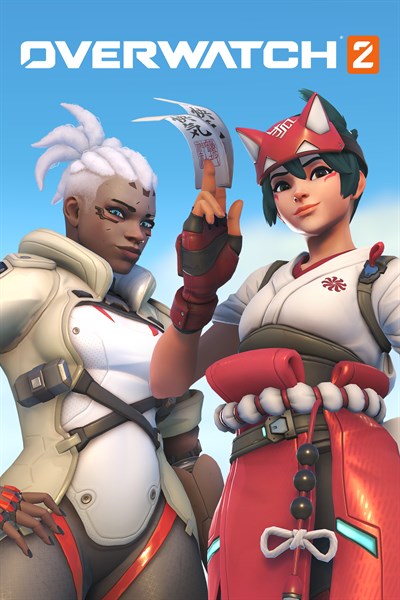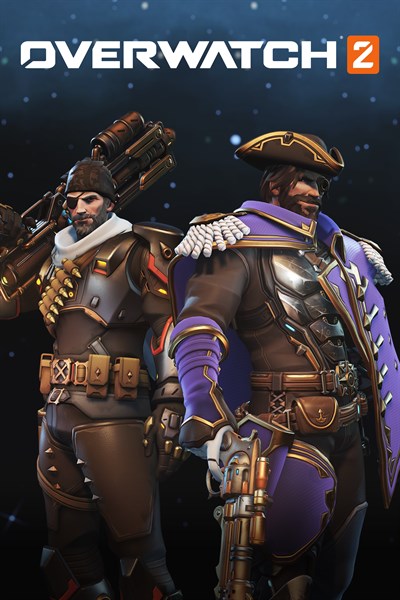Whether you’ve never played Overwatch or have taken a break from it, discovering Overwatch 2 can impress. 35 heroes to understand, a redesign of the 6 vs 6 mode into 5 vs 5, new maps… The amount of content is impressive and the game, one of the most important figures in e-sports, is quite technical. In order to help newcomers or less experienced players, we spoke with two Overwatch experts: Féfé, one of the main streamers of the game in France, and Nuja, a streamer and Top 500 player. They give us their advice on how to get started in the game in the best possible way.

The character types in Overwatch 2 are divided into three different roles: Tanks, Damage Heroes, and Support Characters. Which role would you recommend starting with?
Féfé: I wouldn’t advise any particular role, but rather to try them all. Each one has its own specificities, you have to test everything to find a style of play that suits you. Especially since it allows you to better understand what the other members of the team are doing, what they are experiencing, and to avoid making mistakes that could endanger your partners.
Nuja: I agree with Féfé, but for me, I would advise playing Tank, the most satisfying role for me. It’s probably the most fun for those who have never played before. Especially since the damage heroes will ignore the Tanks and focus on the Support Heroes and other damage heroes, so you’ll be relatively safe. I introduced my girlfriend to D.Va on her first playthrough and she had a blast. I could also recommend Orisa, who has good damage resistance.
Do you have a particular character per role to recommend to discover the game?
Féfé: To learn the role of the Tank, I would say Winston. He’s a character that doesn’t require aiming and you’ll be able to focus on your positioning and space control. He’s pretty easy to play, he’s got both a shield and enough mobility, he’s great at protecting his teammates… I would really say that he is the best character to learn the Tank role.
Nuja: In the damage category, for a beginner, I would think of Soldier 76, which has a basic gameplay very close to the classic FPS and also has a healing spell, which makes you less dependent on supports. In Support, I would say Moira, one key (or button) to do damage, the other to heal, it’s pretty simple and moreover she can escape from a tense situation quite easily.
Féfé: It’s true that it also allows us to have this vision of the Support character who can also do damage and not only heal. I would add Mercy and Lucio, they are characters that you can survive with and that are easy to handle, even at low level. With them you can feel useful quickly. And to learn the role of Support, the most complete character is Ana, it’s not the easiest to play, but it’s the most complete and it also allows you to develop your ability to aim if you play Support before considering other roles.

Each role has a common passive ability for all its heroes. Why is this important for a beginner?
Nuja: Support heroes now automatically regain life if they don’t get hit for a few seconds, which is nice when you’re just starting out: you just need to hide for a short while to be able to go back into battle with full health, no need to know the location of the healing packs on the different maps.
Féfé: It allows a certain self-sufficiency in certain situations and to remain useful simply by surviving, it gives independence to the Support Heroes who will feel less like prey to the opposing Damage heroes. To experience this in game, it’s much more enjoyable than before. The Tank liability is part of the way Tanks have been completely redesigned in the game. They are now more than just shields, protectors, they are real threats, you can less affect their moves, they are no longer subject to opponents, they dictate moves.
How do you deal with such a wide variety of maps and game modes when you’re first starting out?
Nuja: It’s true that there are several different game modes, depending on the map, and that can be confusing at first. There’s convoy escort, point capture, the new Advanced mode. But I think the game knows how to guide you, whatever the mode, it’s all about attacking and defending and you always know where you have to go, it’s always clearly indicated on the screen. Of course, as in any game, there is also learning involved, for example, memorizing the location of the healing packs on each map will eventually be essential.
Féfé: For me, the best solution is to watch content for educational purposes and not necessarily to play. If you just play, you won’t know where to place yourself and you’ll repeat the same mistakes. You have to watch high level competitions, watch where players are positioned on the different maps, watch coaches’ streams or match analysis, because the question of positioning comes up a lot. These are things that will make you evolve much faster than playing for hours.

What are the consequences of switching to a 5 vs 5 mode in Overwatch 2?
Nuja: The game is more aggressive, more dynamic, faster. Damage heroes no longer have slowing or stunning abilities, which can be nice when you’re just starting out, but there are also far fewer shields, so less protection, you have to know how to use the environment. Mistakes are very punitive, in 5 vs 5, when a team member is missing, the team is even more weakened than before.
Féfé: 5 vs 5 also brings visibility, less players use their spells and ultimate abilities, it is easier to understand what is happening during a game. And you also feel that alone you can have much more impact than in the first Overwatch.
It is a team game, in which communication is essential. How do you communicate well when you are a beginner?
Nuja: In the first Overwatch, you could already use shortcuts to communicate about specific things, like giving the charge percentage of your ultimate ability to your allies. In Overwatch 2, a tagging system is introduced. It’s often crucial to prioritize a particular target and it’s an easy way to do so without using a microphone. But I would still advise those who are new to the game to use the microphone as much as possible, especially when playing in ranked games, where communication is key. I think communication is 50% of a win. For example, I play Sombra, and I always warn my allies of an enemy before I hack them. All I need is a Tracer or a Winston to help me take out that target and the advantage is incredible.
Féfé: The best thing is to talk about your own resources, to let your teammates know what tools you have and what you can do with them. If I play Genji and I tell my teammates that my ultimate ability is available, it can help us win a fight and the Ana on the team can use hers, which strengthens my damage, at that moment. Communicating about the opponents’ resources, whether they have just used their ultimate ability or are ready to do so for example, can also be crucial.

The use of ultimate abilities can actually determine the outcome of a fight, what advice would you give about them?
Nuja: At any time, you can see the charge level of your team members’ ultimate abilities by viewing the scoreboard and it is important to take this into consideration. The ultimate abilities may be able to counter those of your opponents, for example Lucio’s ability will help you fight Genji’s, Zenyatta’s ability will counter Soldier 76’s… By being aware of the level of your opponents’ ultimate abilities, you will be able to use yours in an optimal way.
Do you have any advice for those who want to start playing ranked games?
Féfé: You shouldn’t focus on wins and losses. Rather than focusing on winning or losing, you have to pay attention to what you can do to play better, to progress as an individual. You also have to determine your winning conditions. I often give this example: if I play Zenyatta against a shield composition, ranged damage characters, my role, besides healing, is to do damage. If the opponent’s composition includes, say, a Tracer, a Sombra and a Winston, my role as Zenyatta will be to survive. Then I’ll be helping my team better than doing damage. It’s common to see players play their character the same way all the time, no matter what their team is made of and what their opponents are made of. It’s really important to determine your win condition.
Nuja: I would also say that the fact that you can freely change your hero to adapt to a given situation is part of the game’s concept, it’s what gives it its strategic aspect.
Féfé: Yes, you have to avoid having only one string to your bow. Even at a very high level, it is rare to see someone using only one hero. Having an array of, say, three characters per role with different victory conditions is much more interesting.

Thanks to Féfé and Nuja for taking the time to answer our questions. Overwatch 2 is available for free on Xbox Series X|S and Xbox One.

Overwatch® 2
Blizzard Entertainment
Return to ghostly gameplay with Overwatch 2’s Halloween Terror from October 25 – November 7! Revisit previous modes from past Halloween events or battle your way through Adlersbrunn Castle in a new PvE Story Mission—Junkenstein’s Revenge: the Wrath of the Bride! Get new spooky seasonal skins or snag returning cosmetics from previous Halloween events from the in-game shop. 35 HEROES, 22 MAPS AND 6 GAME MODES Lead the charge, ambush your enemies, or aid your allies as one of 35 distinct heroes. Take them into battle across 22 futuristic maps inspired by real-world locations, and master six unique game modes. SEASON ONE IS NOW LIVE New heroes, maps, and game modes will be added in seasonal updates every nine weeks. Drop into Season One and unlock the latest hero, Kiriko, and over 20 tiers of completely free rewards on the Battle Pass. Purchase the Premium Battle Pass to unlock even more cosmetic rewards including the all-new Cyber Demon Genji Mythic skin, legendary skins, sprays, voice lines, weapon charms, and more! A mobile phone number must be linked to your Battle.net Account to play Overwatch.

Overwatch® 2: Watchpoint Pack
Blizzard Entertainment Inc.


